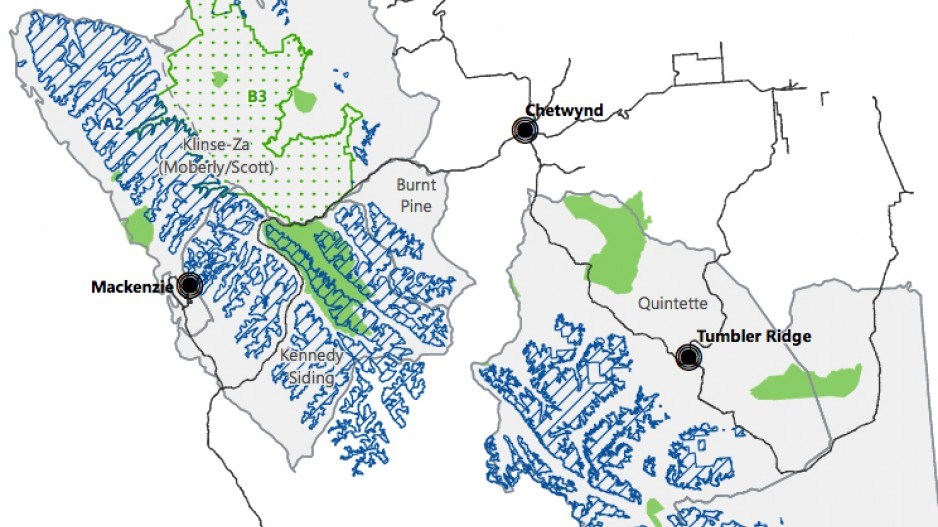The B.C. government is imposing an interim moratorium on commercial activities in the Mackenzie-Chetwynd-Tumbler Ridge area of the Peace region in northeastern B.C. to protect mountain caribou herds.
The industry that will be most affected most by the moratorium is forestry, although other activities like mineral exploration and natural gas would also be affected.
The moratorium is temporary, lasting only until June 2021, until a more permanent recovery plan can be put in place.
The moratorium was announced Thursday, June 20, following the filing of a report by Blair Lekstrom.
The former Liberal MLA and current Dawson Creek councillor was appointed by Premier John Horgan to listen to the general public, following a major backlash in the region against the provincial government’s proposed caribou protection plan.
That plan was done largely in consultation with the two key First Nations in that area, but municipal governments, industry and the general public said they were never informed of the plan.
Lekstrom was tasked with listening to the community and coming back with recommendations for addressing concerns raised by the provincial government’s caribou recovery plan. The interim moratorium on commercial activities was one of 14 recommendations Lekstrom has made.
Lekstrom said he was unable to meet with the West Moberly and Saulteau First Nations, despite several attempts to set up a meeting.
“We were unable, after numerous attempts, to secure that date and that meeting,” Lekstrom said at a press conference this morning.
Chief Roland Wilson told Business in Vancouver that he and his counterpart with the Saulteau weren't intentionally snubbing Lekstrom but they were simply too busy to meet with him.
He added that there's not much he would have to say to Lekstrom that he hasn't already said to the provincial government. He doesn't think a two-year moratorium is enough and that it should be permanent.
"We should just get on with it," he said. "The agreement's ready to go. B.C. is just stalling."
Horgan pointed out that the province is obliged to act, since the federal government has deemed the mountain caribou a threatened species, although it appears the herd have not been officially designated an endangered species yet.
Caribou herds in that region have declined from about 800 in the early 2000s to about 220 today.
Horgan acknowledged that his government did a poor job of consulting with the non-indigenous community before it announced it caribou protection plan back in April.
That failure to communicate and consult with the general public resulted in what has been described as a racist backlash, mostly on social media, against First Nations that have been pushing for stronger caribou protection measures.
“One of the issues we heard, right off the bat, was an increase in racism, an increase in intolerance in the community because a lack of understanding of what the two orders of government and the indigenous communities were talking about when it come to caribou,” Horgan said.
Lekstom said that there is general acceptance in the region that the caribou are in trouble and that conservation measures are needed.
“The concern that was expressed to me was, ‘How did we get to this point without our involvement?’” Lekstom said.
It was a message he said he heard from local governments, business and backcountry users.
The provincial government has spent $50 million to date on caribou protection and recovery on B.C. Those include a wolf cull and a maternal penning program, run by First Nations, in which pregnant caribou are captured, and kept in pens until their calves a couple of weeks old to protect them from predators.
Wilson said the maternal penning program, which has been running for six years now, has been successful. When it started, one caribou herd in the area had fallen from 190 to just 19, and is now up to 80.
"That's a direct result of us doing the penning program," Wilson said.
His people also voluntarily stopped hunting caribou in their territory decades ago, Wilson said.
"Any caribou that get harvested are from other areas where there are caribou," he said.
Wilson said the biggest problem has been logging. When an area is logged, new growth draws in moose, and wolves follow. Roads, seismic lines and even snowmobile tracks make it easier for the wolves to then get into alpine areas where caribou winter.
Doug Donaldson, minister of Forests, Lands and Natural Resource Operations and Rural Development, said the moratorium only applies to new licences and tenures.
“Existing approvals in that area are not impacted,” he said.
The Council of Forest Industries (COFI), is greeting the interim moratorium and Lekstrom's recommendations with some relief.
“Forest sector communities and workers are facing significant challenges," COFI CEO Susan Yurkovich said in a press release. "Timber supply shortages, high log costs and volatile market prices have led to closures and curtailments across the Interior of the province. Considering these circumstances, it comes as some relief that the province has seen fit to pause to ensure that collectively we strike the right balance between caribou recovery and economic viability."




